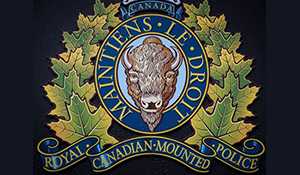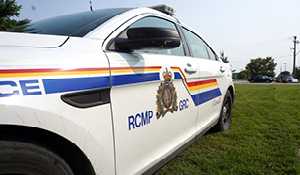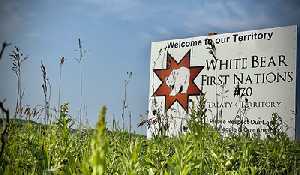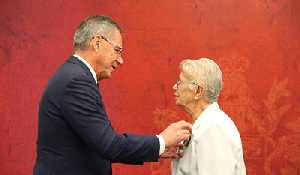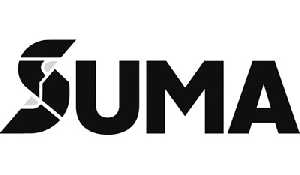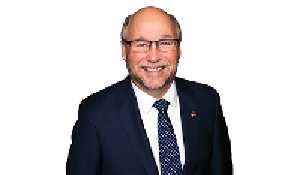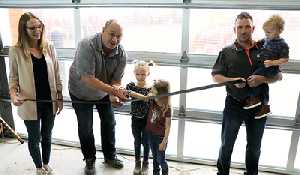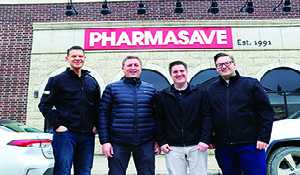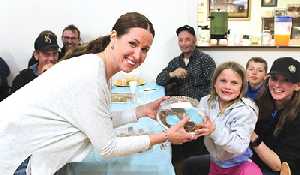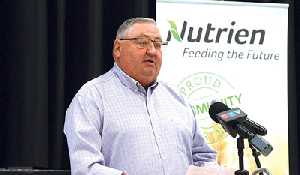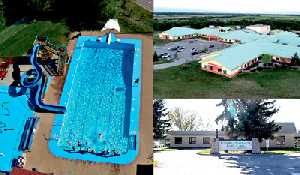Tanya Birkbeck changing lives in Haiti, working with World Food Program
Tanya Birkbeck grew up near Welwyn, and her career has taken her to Montreal, London, Sudan, and now Haiti
March 11, 2024, 10:44 am
Ashley Bochek
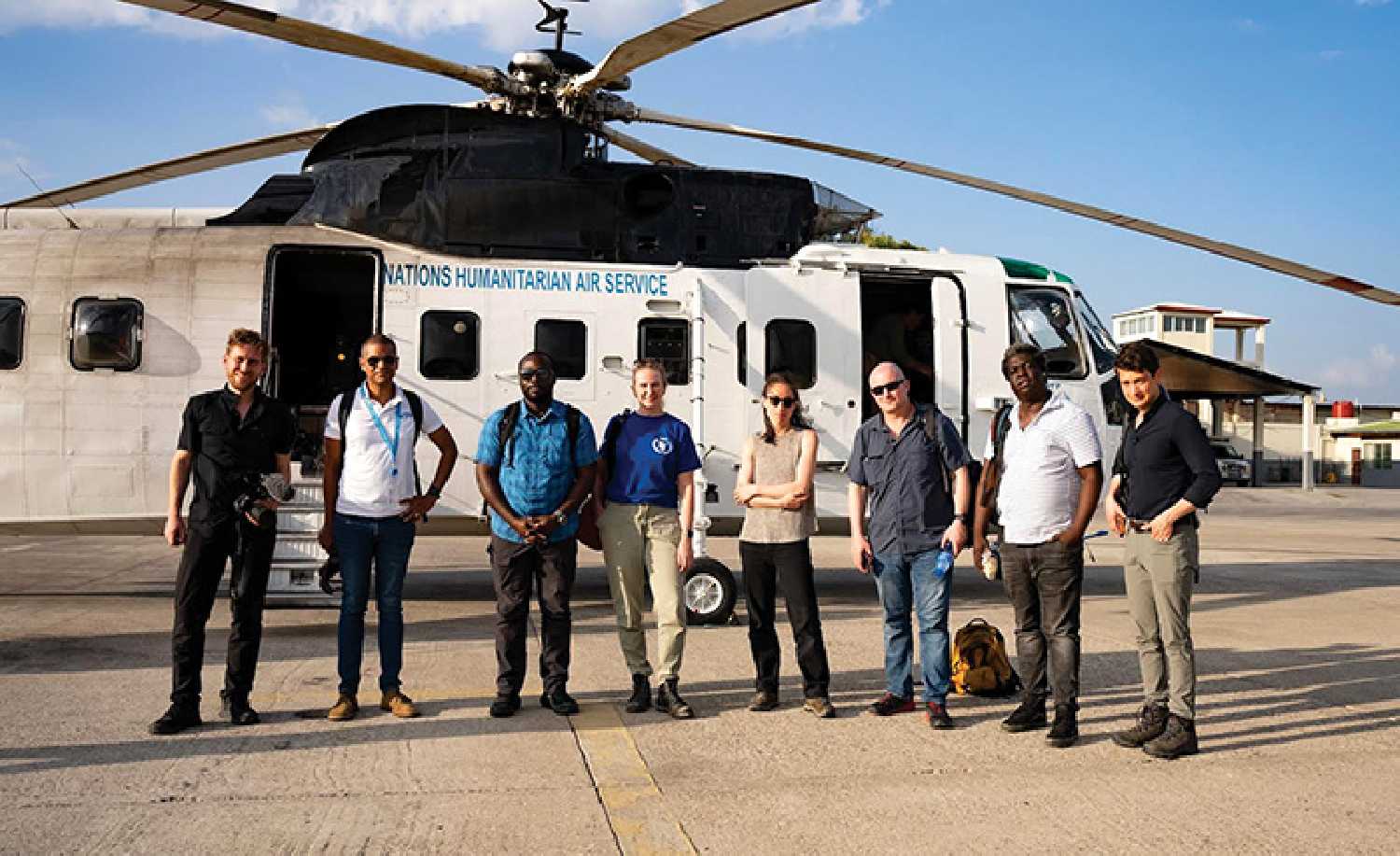

Tanya Birkbeck has gone from one of the main food growing areas of the world to working with an agency distributing food to the world’s most needy. She grew up on a farm outside of Welwyn and now is the Head of Communications for the World Food Program (WFP).
She is stationed in Haiti and sees the effects of food insecurity in the country. The World-Spectator interviewed Birkbeck about her work:
What is your role with the World Food Program?
I am head of communications for the World Food Program (WFP) in Haiti. It is the world’s largest humanitarian organization. We are primarily concerned with food security. Our slogan is Saving Lives, Changing Lives. A lot of people will associate WFP with images of truckloads of food being delivered in the case of an emergency such as a storm or in conflict situations, or airplanes dropping parachutes of food to areas that have been affected by food insecurity, and that is part of what we do. In Haiti, emergency response is part of what we do, and is important. It saves lives.
We also have the aspect of working long term and changing lives. This is where we are working to address the root causes of hunger. That can include collaborating with local farmers, helping them to find local markets and increase their production. I really like this part of my job because it draws on my own roots.
I grew up on a farm just outside of Welwyn. For the past several years I have been working with farmers in different places around the world and that is something I am quite passionate about. We’re not just working with providing emergency rations, that is part of it, but part of it is this work to help countries grow their own food. A lot of times food insecurity has to do with things like a lack of capacity to produce enough food, it has to do with the capacity to move food from one place to another. It’s not so simple that there is just not enough food or that there is not the capacity to produce it. It could be that the farmers maybe just don’t have the tools, or it may have to do with regulations.
What is happening right now in Haiti?
On Thursday, February 16, we issued a press release because we are really concerned about recent violence in Haiti. It has been difficult in Haiti for many years, but in the last couple of months, since the beginning of 2024, we have seen an uptick in the amount of violence. We are quite concerned about our ability to reach people at this moment. We look at the trends of what is happening with the organization and what messages you want to communicate at that moment. It could be a call to action, like right now we are saying we really need to have a certain level of security, which will allow for movement of humanitarian goods, and other times it can be sharing the results of reports which look at the levels of food insecurity.
Sometimes it can be telling the stories of the people that we work with, but we also tell stories and publish them on our own website. We also work very actively with journalists, and it is exciting stuff.
Unfortunately, the security situation in Haiti is very difficult, so that often means that it takes a lot of logistics to be able to get journalists to be able to tell stories of the people we are able to assist.
Sometimes that means taking them in a helicopter because it is not secure enough to drive from one place to another or arranging with communities in some of the most impoverished or dangerous neighborhoods in Port-au-Prince so we can go and meet the people. We work with the government and local organizations and together we all co-ordinate to make sure we can reach these people.
Working with journalists is a big part of my job and it also includes managing communication within the organization itself. We are a humanitarian organization that works in many different countries around the world, so we want people to know what we are doing here.
I work with a team that also includes Haitians, we have a Haitian photographer, we have a Haitian communications officer, to help communicate not only with the international media, but also with the local media so that the people in the country that we are serving understand what we are doing and why we are doing it. The local community needs to know because sometimes people don’t understand the way big international organizations work, where we are putting our funding and how we make decisions, which is why it is important to us to communicate with the people living in the countries where we are working.
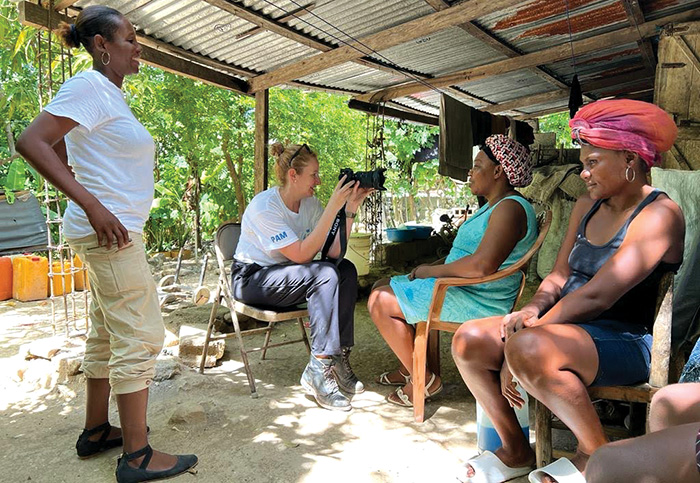

What does Canada contribute to the WFP?
I work very closely with our WFP Canada office because Canada is one of our most important donors. We have a close partnership with our WFP Canada office to communicate what we are doing with WFP funds here in Haiti.
Canada is a really important donor to WFP and a major part of what Canada gives money for is school meals. That is a significant activity of WFP. We provide school meals to about 420,000 students across the country and for most of these kids it can be the only meal they have in a day, and Canada is a major donor to that, so I get to see the very significant impact of Canadian funding here. There are kids who are eating who wouldn’t get a meal otherwise, if it weren’t for the assistance of Canada.
What did you do before working with the WFP in Haiti?
I used to work for the Food and Agricultural Organization (FAO) in South Sudan. There we did a lot of communication with farmers as well. We had a radio program where we gave weather information and we gave advice to farmers. It would link the people in rural areas in South Sudan where there is quite a low level of literacy. Radio is a very important medium for us so we would use it a lot and we would give information on what our organization does, weather information, and give advice on how farmers can improve their techniques or how livestock keepers could help keep their cows, sheep, goats, and chickens healthy.
Radio was a super important medium for us in that particular setting. Before that I worked many years as a journalist. I attended the University of Regina Journalism School and I worked for CBC in Regina. Then, I was in Montreal for about a decade and as most people do working in journalism these days you do radio, television, writing for the web, and I was also a radio producer for a few years, so I do have a strong background particularly in broadcast media. Then for a few years I also worked as a freelance journalist and did some international reporting, I did some reporting for the Globe and Mail, leading up to my career now, with the United Nations. That experience as a journalist has really informed the work that I do now, especially because I am interacting a lot with journalists now, so I know what they need to tell their stories and how to integrate what the organization I am currently working for does, how to integrate that into the story of the journalist so it all ties together.
How did you get to where you area, working with the WFP, from growing up in rural Saskatchewan?
It is interesting. I have thought about that a lot to be honest. A lot of people from small-town Saskatchewan go on to do much greater and more interesting things than I have done. It is true I have a very international career where I am travelling all the time. It could look quite romantic to some people maybe. I think one thing is that the world has changed a lot. I grew up on a small farm with very little contact with the outside world except that I was a big reader, and I couldn’t just look something up on my smart phone. I read a lot and became really fascinated by the world and by other countries. I always was creative, and I liked to create my own magazines at home and to write. I’ve always loved writing, I used to write fiction and submit my stories to competitions when I was a teenager.
Once I was in university, I thought I wanted to be a teacher. I started out in the college of education and then realized I could get paid to write and to communicate with people and then that just seemed like that’s not even work. Once I started working as a journalist, I immediately knew I wanted to tell stories from all over the world. When I was at the U of R and I was looking at all of the internships available, I was like ‘which one is the farthest away?’ So, I ended up doing my internship in Newfoundland. Then, I did a graduating scholarship in London which was with an international press agency and then I came back, and I worked in Canada for many years, but whenever I had a chance to travel, I would always pitch a story wherever I was travelling to and submit that story for the international affairs show on CBC. I have a son and was a single mom for many years. I was mostly in Canada and I didn’t really feel free to leave when I had my son. I wanted him to have a certain amount of security, especially for his high school years, but once he had finished high school, we kind of did the opposite of what most people do and I was like ‘okay, I am leaving you the apartment in Montreal.’ So, he started his post-secondary education there and I left.
I started working for an NGO in South Sudan, in Lebanon, and now I am here in Haiti. Once you are working in this world, one thing kind of leads to another. It was something I knew I wanted to do, so once I felt I was personally in a position where I had a significant amount of career experience that I could go out there and manage to share some information, I started working a lot as a journalism trainer and as a mentor and I felt like I had enough experience as a journalist that I had something to share with junior journalists working in other countries and the confidence to go and just try and do something different.
I do feel a very strong connection still to Saskatchewan and the farm particularly, and I visit often, but I have this need to see the world and understand the conflicts and the drivers behind the stories we see in the newspaper. It has always been there, it’s not good enough for me to just read about. I am like ‘no I want to go there and see what is actually happening.’
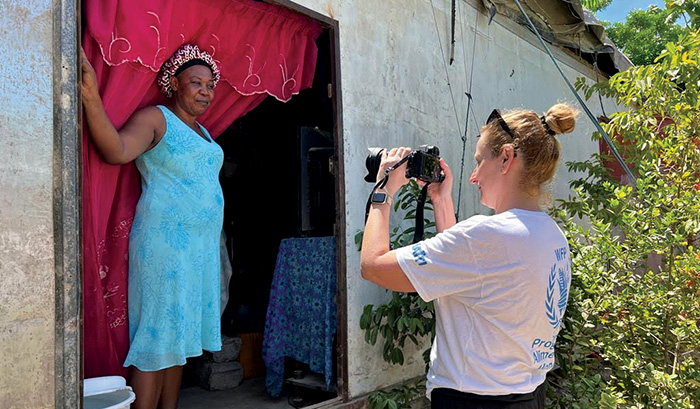

How do you deal with dangerous situations that come with living in places like those?
The risk is real. I wouldn’t recommend anyone coming here at this particular moment; The country is very insecure. Just last week we had a lot of anti-government protests in the area immediately surrounding the office and it was affecting the whole country. It affects our sub and regional offices around the country, it affects more than anything the Haitian people themselves, but there are dozens of armed groups. They kidnap, they rape, they burn people’s houses, and this is happening on a constant basis. Recently, every couple of weeks we have thousands more people who are displaced within the capital. This is the context we are living and working in.
We’re working as part of an international organization which has a framework. There are a lot of measures to mitigate the risk, so we know the rules. For the last several years here in Haiti and in South Sudan I have lived with a curfew. It is a security rule. There are rules on your movement, you need to inform people when you are moving from one place to another. As I mentioned, there are a lot of places in Haiti where we cannot move by road—it is too dangerous so we need to move by air. We work with a team of experts because I move around a lot with journalists, I could not do it without the security team.
Every time I have journalists coming and saying ‘We want to go out and see this or that place,’ then the first thing that I do is go to the head of security and we talk logistically whether or not we can make it happen, with the safety of our personnel being our number one priority. You’re not scared because it is part of a system that there are measures in place, and you know what you need to do in order to protect yourself. That is not to say something unpredictable can’t happen because it can, but you have put in place the mitigating measures that you can, so you know that every time that you go out you have prepared properly, and you have done everything you can to reduce the risk and then you do your job.
With the language barrier, how do you communicate with the Haitian people?
Absolutely no matter where I am working, I could not do it without my local colleagues. We tend to think of international organizations being only international people that come into a country and work in a country. There are international staff here, but the vast majority of people that work for WFP or any other organizations here are Haitians. The language here in Haiti is Haitian Creole. In South Sudan where I did a lot of radio, there are 63 different languages there. Some people use Arabic or English to communicate between certain groups, but in Haiti it is principally Haitian Creole. Thankfully I have an amazing team that speak Creole.
With the amount of food insecurity in Haiti right now, what are the next steps the WFP will be taking to help? What are your plans?
The situation right now is quite serious. The total population of Haiti is 11.45 million. Right now, there are about 1.4 million people who are in what we call emergency level food insecurity. All over the world there is a standardized system with five stages that we use to measure how hungry people are. Levels three, four or five are what we consider to be people who are acutely food insecure, and there are 4.35 million in Haiti at that level, and that is about 44 per cent of the country. Then when you get to level four, which is the level before famine, it is 1.4 million. There is not a famine here right now and it is relatively rare that a famine is declared—there is a whole process to declare a famine. This is a system used internationally to measure the level of food insecurity.
Per capita, Haiti is one of the most food insecure countries in the world. We ask people how many meals a day do you have and what kind of variety of food do you have and there is a scale where you can measure how much people are lacking basic nutrition. A lot of that is happening because roads are blocked. It is very difficult for people to move food from one area to another and Haiti is quite dependent on imported food. So, food that is coming into the capital, it is very difficult to get that food to rural areas because those areas are all blocked by armed groups.
Even within some of the rural areas, the armed groups are stopping farmers who have food in their field and the farmers and the people who transfer the food from the farmers to the market are being intercepted by armed groups.
A big problem of the food insecurity in Haiti is because the food cannot move around. We have seen some farmers who have to leave their crop to rot because they can’t get it to market, and imagine how heartbreaking that would be for a farmer in Saskatchewan who would for example have to leave their wheat in a bin to rot because they can’t sell it to the market and that is what is happening here. Then, not that far away you can have a hospital with a pediatric ward with more malnourished children than they can admit.
I have seen hospitals turn kids away. There are other factors, the economy has been affected by political and physical insecurity of these armed groups and there is high inflation. People may not have access to work and then the prices in the market go up, so there are all these factors which lead to a lot of people, in particular children, not getting enough food.
What services does WFP provide to Haitians in difficult situations?
In the last couple of weeks, we were not able to reach our partners to do emergency distribution in Cité Soleil which is one of the poorest parts of Port-au-Prince. In that case we give people bags of food. We also give people cash transfers, and the beneficiaries are identified. Through the communities and local organizations, we identify who are the vulnerable families, people with young children, older people, or people with disabilities, and we give them a cash injection each month.
That allows them to make their own decisions about what kind of food do they need and if they have enough food and live in a rural area, they can maybe buy a goat which would give them perhaps more food in the future. It can look a bit different—it could be an immediate need or help them invest and to be able to help themselves.
We also give school meals, and this is something that is important to what we do in the country because we have so many children who aren’t getting nutrition at home, but if you give them school meals, that also increases the attendance of the schools. Kids are more likely to show up rather than dropping out if they are getting a meal every day. That is one of our concerns right now with lots of schools closing because of insecurity, so then those kids aren’t getting those meals, so not only are they not learning but they aren’t being nourished. The interesting thing we are doing with school meals is replacing imported food with local food. School meals used to be made from imported ingredients, but now about half of all the students that receive school meals—and we have 420,000 students that receive school meals in Haiti—are receiving what we call homegrown school meals. We are really proud of this program, and we are working towards hopefully by 2030 having 100 per cent homegrown school meals. It is benefiting the farmers in the communities and of course the kids who get the hot meal. We also have longer term solutions which help people to feed themselves.
Something that will be super familiar to people in Saskatchewan is the concept of Crop Insurance. We have started a program where we pay a small premium for farmers and then again in the case of flooding or drought there is a certain threshold that they can trigger a payout. The idea is that this is not something WFP wants to do forever, but we want to introduce the concept so then eventually farmers will see the value in it and start to invest in themselves. It is to help reduce the risk and help the farmers confidently produce more. Especially since Haiti is in the Caribbean area where it is very susceptible to extreme weather events.
You could have some areas of the country that are flooding and on the other side of the country they are in a drought. The other thing we see is a lot of displaced people and that’s increasing. Just in the past 10 days we had about 10,000 people displaced within the capital, so we also work with the government to provide immediate assistance for these people and sometimes that means working with a third party provider to bring in hot meals for them because it tends to be mostly women and children that we find in these camps all over the city for displaced people. Then, we will gradually transition towards what we call Community Kitchens, that is where we use dry rations that we have in our warehouse, we add fresh produce, maybe some fish, and then we cook meals for thousands of people in a huge kitchen and then we deliver it to Internally Displaced People (IDPs) within the city.
Then gradually we transition them to cash transfers. It helps them get their feet back under them after they have often been displaced by armed groups coming into their community, sending them running for their lives with the clothes on their backs, they don’t have any of their belongings or any reliable income.
It is very difficult for them to provide for their families in that situation, so we help people not forever, but to make that transition and adapt in this shocking situation.
What are the most rewarding things you’ve been able to do throughout your career? What are the moments that stand out to you?
I do think we make a difference. The most rewarding part is just the people. When you meet somebody where there has been a small change, but it makes an impact in their life. There could be a million examples like this, but I was in the south of the country last year and we met with some mothers that have received these past transfers and they had got together in a group and created a business where they were making their own soap and selling soap in the markets as well as charcoal. You meet these moms, and I think any mom can relate with that, where you confidently know you are going to be able to provide for your kids.
I am also a mom and I know how much you want to make sure your kids are okay and if you see that you have been able to make some difference like that. Just to be there. I like the idea very much of being able to somehow build some empathy and understanding between people because I feel like Haiti has had a lot of problems throughout the years, and that could help.
Everybody knows about the massive earthquake in 2010, there has been a lot of political upheaval, Haiti is very vulnerable to extreme weather and people tend to be like ‘Haiti is always a basket case’ and I think it is to try and get through that defense that people have and make them see the real human beings inside that story. I guess that is fundamentally what we are trying to do.
From a personal point of view, doing this kind of work, it truly has given me a sense of gratitude, so just to be able to enjoy simple things like the security to go out and have a meal with your family in a restaurant safely. We take it for granted, but here it isn’t something available.
Those simple joys are very rewarding.
I compare it to the area where I grew up and the lifestyle I grew up with.
I feel for the farmers here who aren’t able to get their crops to the market and I imagine how farmers in our area would feel if their areas were invaded by people with guns and they could see kids starving and they weren’t able to feed them.
I know the pride of the people where I grew up, and people elsewhere feel that, too. It’s being able to get people to understand that these are people just like you, and this is what’s happening to them. Tweet
